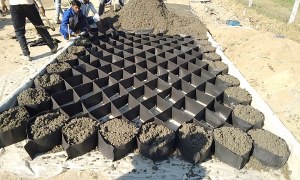🕑 Reading time: 1 minute
PRECAST CONCRETE PROCESS
A large number of concrete structures (about 6% of the building frame market) are precast. The individual components are prefabricated off site then taken to site where they are erected.
The following figures illustrate the precast concrete process:
1. Production of reinforced cages and main connections:

The precast factory often has specialist workshops for the manufacture and maintenance of moulds, and for the production of jig-built reinforcing cages and connections.
2. Assembly of moulds:

The reinforced cage is positioned in the partly assembled mould, then the remaining mould section is completed.
3. Mix being poured:

Carefully specified concrete is placed into the mould. Many precast works now employ computer controlled batching plants.
4. Compaction of concrete using poker vibrator:

To ensure that optimum density is obtained and that specified strengths are achieved, concrete is placed and compacted using high-frequency external vibrators or pokers.
5. Precast concrete being moved to the storage area:

Once an appropriate strength has been reached, the precast units are moved to the storage area. Units are usually handled within hours of casting as part of the rapid production cycle.
The product exhibits a high degree of dimensional accuracy and quality of finish. Economies of production are achieved through the repetitive and automated process.
6. Storage of high-quality units in works area:

The finished precast components are stacked on clean battens or plastic pads positioned to suit the design of the component. Care is taken to keep the stacks vertical and to ensure that battens are placed directly above one another within the stack.
7. Transport to site:

The components are delivered to site in a pre-determined sequence to ensure that hardened concrete are ready for instant erection.
8. Erection at site:

The components are erected straight from the lorry. This leads to faster erection times with reduced on-site activity.
9. Finished building:



